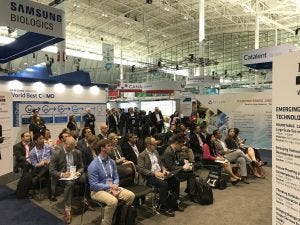
Amgen will challenge AbbVie’s bestseller Humira in the US from 2023, following a lawsuit settled last year. Other adalimumab developers are likely to receive the same deal, an IP lawyer says.
In September 2017, Amgen and AbbVie reached a settlement resolving all pending litigation in relation to the former’s Amjevita, a biosimilar version of the latter’s top-selling monoclonal antibody Humira (adalimumab).
Amjevita became the third biosimilar to approved by the US Food and Drug Administration (FDA) in September 2016, but under terms of the settlement Amgen will not launch the product in the US until January 31 2023.
Samsung Bioepis – a joint venture between Samsung BioLogics and Biogen – reached a similar conclusion with AbbVie in April.

Kevin Noonan spoke as part of the Insider series at the BPI Theater at BIO 2018
Other adalimumab biosimilar developers lining up to take a slice of the market include Boehringer-Ingelheim with its approved product Cyltezo, and Sandoz.
And according to Kevin Noonan, a partner with McDonnell Boehnen Hulbert & Berghoff LLP, such firms are likely to receive similar deals with the reference drugmaker if any legal action is undertaken.
“You can always challenge AbbVie’s patents again and AbbVie at the very minimum should give you at least the deal they gave Amgen,” he told BioProcess Insider at the BIO Convention in Boston last month. “It sets a stake in the ground.”
Speaking as part of the BioProcess International Theater, he added what adalimumab developers should be aware of is whether or not there’s going to be an antitrust problem. “That’s the type of thing that the FTC [Federal Trade Commission] will probably look at.”
$18 Billion Illustration
Last year, Humira brought in global sales of US$18.3 billion (€15.7 billion) for AbbVie, $12.4 billion of which came from the US.
According to Noonan, Humira “is a big deal only because the drug is such a big drug,” and the associated lawsuits are no different to legal battles with traditional generic drugs.
“There’s a lot of money to be made, a lot of money to be lost. You have a question of while you’re going to take a lawsuit where if you lose as the biosimilar you’re off the market till the patent has expired which is much longer than 2023,” he said.
And from the innovator’s point of view, he asked whether AbbVie would be willing to trade some of that exclusivity for the certainty of knowing when the biosimilar is going to come on the market, “then make the business case and how you deal with that and deal with potentially lost lots of money.”
European Uptake
The first Humira biosimilars are likely to arrive in Europe later this year. We asked Noonan why historically Europe has been quicker on the uptake of biosimilars than the US.
“As an American I think that the rest of the world has a lot more jaundiced view of the whole idea of patenting. The idea was getting drugs to people, and remember that in many countries in Europe the government is involved. You have the government’s push: “Let’s get cheaper drugs to patients more quickly.”
About the Author
You May Also Like

schedl_b_and_w.jpg?width=100&auto=webp&quality=80&disable=upscale)
schedl_b_and_w.jpg?width=400&auto=webp&quality=80&disable=upscale)



